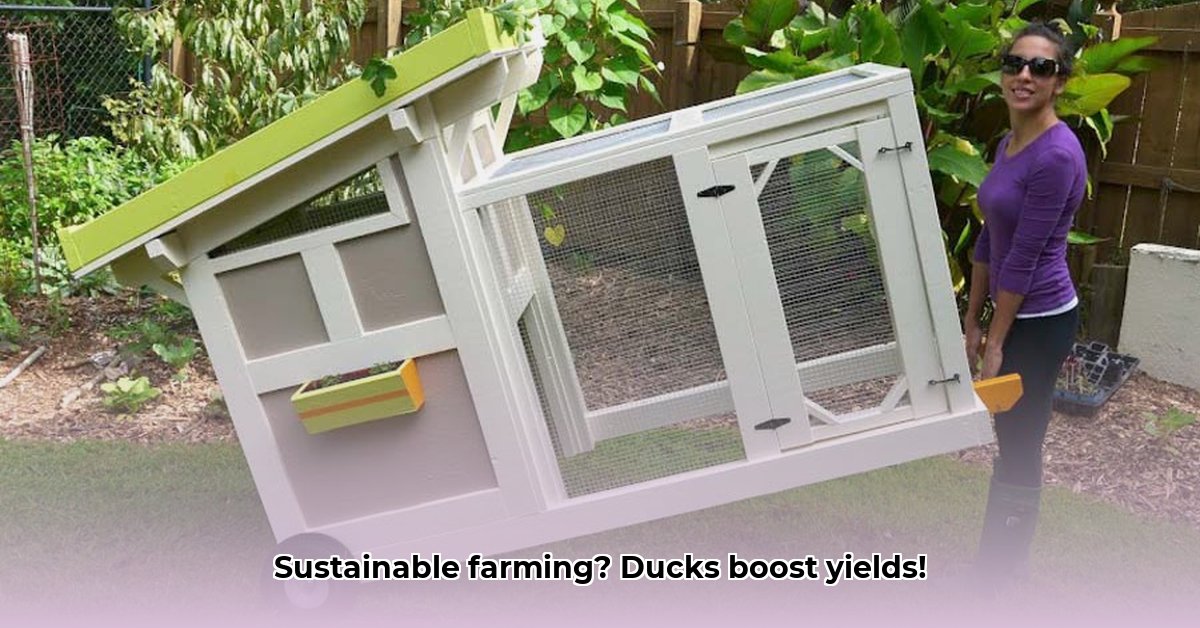
Duck Houses: A Natural Boost to Farm Productivity and Sustainability
Let's explore a surprisingly effective way to enhance your farm's productivity and environmental footprint: integrating duck houses into your sustainable farming practices. Far from being a whimsical addition, strategically placed duck houses, readily available from Tractor Supply, can significantly improve your yields and contribute to a healthier ecosystem. For more information on raising poultry, check out this helpful guide on buying chicks from Tractor Supply.
Think about traditional farming's reliance on chemical fertilizers and pesticides. These are costly and environmentally damaging. Ducks offer a natural, cost-effective alternative. They act as efficient pest controllers, consuming slugs, snails, and other crop-damaging insects. This natural pest control directly translates to higher yields and reduced reliance on harmful chemicals. But the benefits extend further. Duck droppings are a rich natural fertilizer, enriching your soil and reducing the need for expensive chemical alternatives. This dual benefit—pest control and natural fertilization—leads to healthier soil, increased crop yields, and reduced environmental impact. Isn’t that a compelling reason to consider this sustainable farming strategy?
Choosing the Right Duck House from Tractor Supply
Tractor Supply offers a variety of duck houses, each designed to meet different needs. Selecting the right one is key to maximizing efficiency and ensuring your ducks’ well-being. Here's a checklist to guide your purchasing decision:
- Duck Breed: Different duck breeds have different size and space requirements. A Pekin duck needs considerably more space than a smaller Call duck. Research your chosen breed to determine the appropriate house size for their comfort and health.
- House Size: Avoid overcrowding. A crowded duck house leads to stress, disease, and reduced productivity. Ensure ample space for movement, feeding, sleeping, and social interaction.
- House Materials: Durability is paramount. The duck house must withstand harsh weather conditions. Look for sturdy construction using weather-resistant materials that will provide years of reliable service.
- Predator Protection: Sadly, ducks have predators. Choose a house featuring robust wire mesh or other protective features to deter raccoons, foxes, and other threats.
Setting Up Your Duck House: A Step-by-Step Guide
Once you've selected your duck house, installation is relatively simple:
- Strategic Placement: Choose a location convenient for the ducks while offering protection from predators. Proximity to a water source is crucial, and shaded areas provide refuge from extreme heat.
- Secure Mounting: Securely fasten the duck house to a sturdy post or tree using appropriate hardware to prevent tipping or displacement.
- Regular Maintenance: Regularly inspect the duck house for damage, wear, and tear. Promptly address any issues, and maintain cleanliness to prevent disease.
The Financial and Environmental Benefits of Biodiversity
While the initial investment in a duck house from Tractor Supply is relatively low, the long-term benefits are considerable. Consider these factors:
| Factor | Cost | Benefit |
|---|---|---|
| Initial Purchase | Price of duck house from Tractor Supply | Reduced pest damage, natural fertilizer, improved soil health |
| Maintenance | Minimal; cleaning, occasional repairs | Reduced expenses on pesticides and fertilizers, increased crop yields |
| Potential Government Incentives | Varies; depends on location and programs | Significant cost savings for sustainable farming practices |
Did you know that integrating duck houses into your farm not only reduces expenditure on chemical treatments and boosts your harvest, but also aligns your practices with increasing consumer preferences for sustainably produced food? This can increase your farm's market competitiveness.
Embracing the Future of Sustainable Agriculture
Integrating wildlife habitats into farming practices is a rapidly growing trend. Consumers are increasingly aware of the environmental impact of their food choices and favor farms committed to sustainable practices. By embracing this approach, you're not only improving your farm's efficiency but also building a reputation for environmental stewardship. This is a powerful combination of economic sense and social responsibility.
Dr. Emily Carter, Professor of Agricultural Ecology at the University of California, Davis, states, "The integration of wildlife habitats into farming systems is no longer merely a ‘nice-to-have’ but a critical component of long-term agricultural sustainability. It enhances biodiversity, improves soil health, and contributes to a more resilient and productive agricultural landscape."
The long-term potential of integrating wildlife habitats, such as duck houses, is significant. Further research is ongoing, uncovering additional benefits and refining best practices. Don't hesitate to adopt this sustainable farming method! Investing in a duck house from Tractor Supply is a smart, forward-thinking step towards a more productive and environmentally responsible farm.